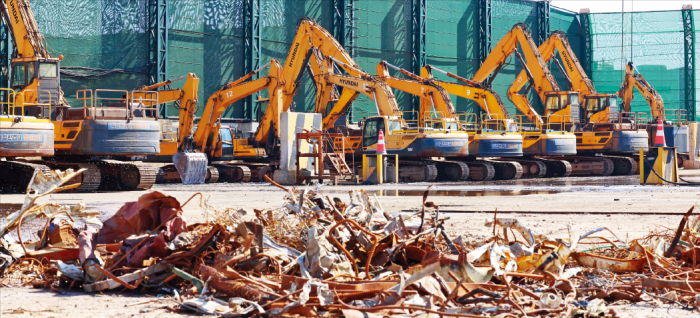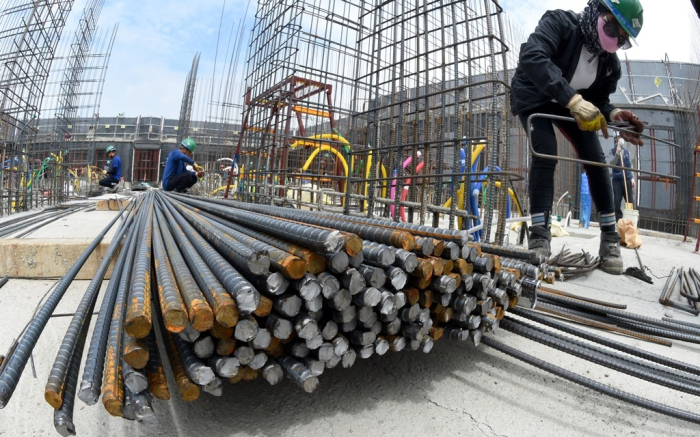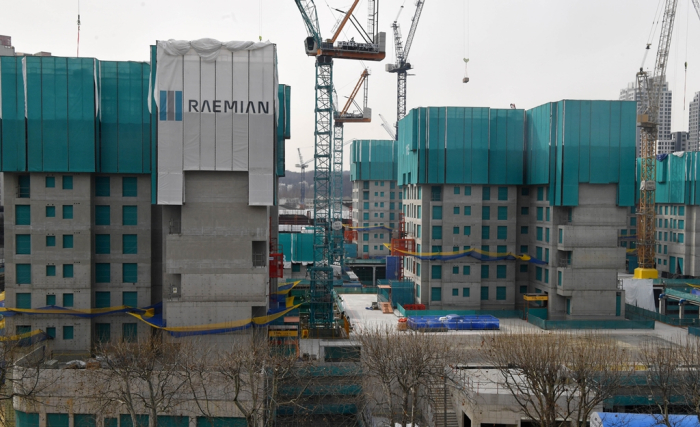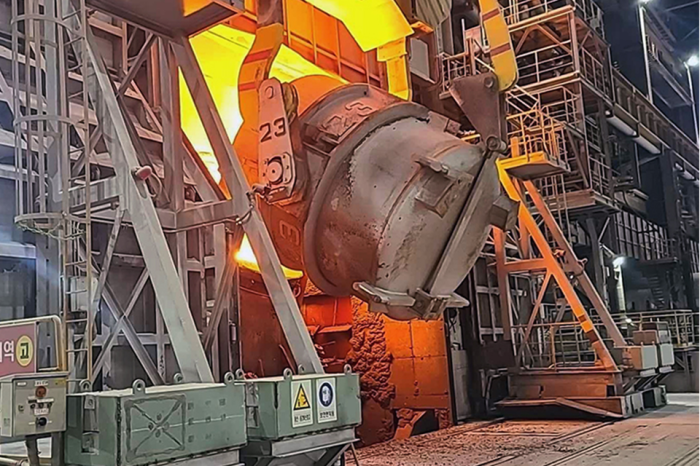Steel
South Korean steelmakers run plants only at night as demand plummets
Dongkuk Steel has turned its electric furnace off during the day and its peers are set to follow suit
By Jun 05, 2024 (Gmt+09:00)
3
Min read
Most Read
LG Chem to sell water filter business to Glenwood PE for $692 million


Kyobo Life poised to buy Japan’s SBI Group-owned savings bank


KT&G eyes overseas M&A after rejecting activist fund's offer


StockX in merger talks with Naver’s online reseller Kream


Mirae Asset to be named Korea Post’s core real estate fund operator



South Korea’s major steelmakers are running their plants only at night to cut costs as demand for rebars, or reinforced bars, widely used in the construction of apartment houses is plummeting amid the economic slowdown.
Dongkuk Steel Mill Co., the country’s No. 2 rebar maker, recently changed its four-team, three-shift work system to a night shift production schedule at its electric furnace in Incheon to operate overnight from 10 p.m. to 8 a.m.
“Unless demand significantly rises, we plan to continue working only at night,” said a company official. “With this measure, the factory operating rate will drop to the 60% range from 87.3% last year.”
Dongkuk, which produces 2.2 million tons of rebar products annually, hopes to cut production costs through these measures.
At night, electricity rates are half the daytime rates. Power prices account for about a tenth of steel production costs.

With rebar demand plummeting due to the worsening situation in the construction industry, analysts say other Korean steelmakers are set to follow suit by turning their electric furnaces off during the day.
RISING INVENTORIES
Dongkuk’s rebar inventory has risen to 660,000 tons in the first quarter, up 40% from 470,000 tons in the year-earlier period. The latest figure represents the highest since the company began looking into monthly average inventory levels in 2012.
The rising inventory is largely due to a significant fall in the construction of new buildings and rising rebar imports from China.
As inventory piles up not just at Dongkuk but also at seven other rebar makers in Korea, domestic rebar distributors are pushing out products at 700,000 won ($511) a ton, much lower than their purchasing price of 900,000 won a ton, according to industry watchers.
“If production volumes decline with more steelmakers turning to a night shift system, the market’s oversupply situation will ease,” said an executive at a local steelmaker.

GAME OF CHICKEN
Reinforced bars used in apartment frameworks account for more than 90% of the domestic construction market. The worsening construction industry is one reason for higher inventory, but a bigger problem is the chronic oversupply situation, analysts said.
Korean rebar makers have been engaged in a “game of chicken” to keep their market share as they refrained from slashing production despite rising inventories.
According to the Ministry of Land, Infrastructure and Transport, the number of housing permits dropped to 74,558 houses in the first quarter, down 13.7% from 86,444 houses a year earlier.
The sharp decline in new apartment construction hit steelmakers’ earnings hard.
Dongkuk Steel posted 52.5 billion won in first-quarter operating profit, cut by more than half from a profit of 127 billion won in the year-earlier period.

MAINTENANCE AND REPAIR WORK
Hyundai Steel Co., also suffering from sluggish demand, said it is in the middle of unscheduled maintenance and repair work at its electric furnace in Incheon from February through June.
Regular maintenance and repair work usually takes two to three weeks and industry officials said Hyundai Steel’s longer-than-usual work stoppage is tantamount to voluntary production cuts.
Hyundai Steel is also slated for three-month maintenance and repair work at its plant in Dangjin, South Chungcheong Province from the middle of September.
“We want to be more flexible in controlling our inventory through the maintenance and repair work,” said a company official.
Chang In-hwa, the new chairman and chief executive of Korea’s top steelmaker POSCO Holdings Inc., said in April that the company is also tightening its belt.
“We will take drastic cost-cutting measures to counter difficulties caused by global steel oversupply and the intensifying US-China trade war,” he said.
Analysts said worsening profitability at Korean steelmakers could negatively impact their investments in eco-friendly future projects, including adopting an industry initiative to achieve zero carbon by 2050.
Write to Sang-Hoon Sung, Woo-Sub Kim and Hyung-Kyu Kim at uphoon@hankyung.com
In-Soo Nam edited this article.
More to Read
-
 Corporate strategyPOSCO tightens belts, seeks M&A within 3 years: new chairman
Corporate strategyPOSCO tightens belts, seeks M&A within 3 years: new chairmanApr 23, 2024 (Gmt+09:00)
3 Min read -
 SteelKorean steelmakers mull anti-dumping suit vs Chinese, Japanese firms
SteelKorean steelmakers mull anti-dumping suit vs Chinese, Japanese firmsJan 17, 2024 (Gmt+09:00)
3 Min read -
 RoboticsDaedong partners with POSCO to build first robot for steel mills
RoboticsDaedong partners with POSCO to build first robot for steel millsDec 21, 2023 (Gmt+09:00)
2 Min read -

-
 SteelJapanese steelmakers flood South Korea on back of weaker yen
SteelJapanese steelmakers flood South Korea on back of weaker yenSep 20, 2023 (Gmt+09:00)
4 Min read
Comment 0
LOG IN


